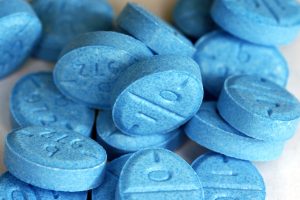Facing the stress of school or work, who hasn’t wished for a brain-boosting pill to make work feel easier? Unfortunately, “study drugs” like Adderall can have severe, sometimes life-threatening consequences. Here’s everything you need to know.
Adderall Explained
 Adderall is the brand name of a prescription drug with two active ingredients: amphetamine and dextroamphetamine, or amphetamine salts. Although primarily used to treat attention deficit hyperactivity disorder (ADHD), it is also used to treat certain sleep disorders, such as narcolepsy. When taken as prescribed, Adderall increases cognitive function and alertness. However, the same results that have prompted doctors to prescribe the drug have also driven recreational users to abuse it. Because of its focus-enhancing effects, Adderall is known as a “study” drug. College students and young adults in high-pressure careers are particularly susceptible to Adderall abuse, as fierce competition drives them to gain a mental edge even at the risk of their physical and mental health.
Adderall is the brand name of a prescription drug with two active ingredients: amphetamine and dextroamphetamine, or amphetamine salts. Although primarily used to treat attention deficit hyperactivity disorder (ADHD), it is also used to treat certain sleep disorders, such as narcolepsy. When taken as prescribed, Adderall increases cognitive function and alertness. However, the same results that have prompted doctors to prescribe the drug have also driven recreational users to abuse it. Because of its focus-enhancing effects, Adderall is known as a “study” drug. College students and young adults in high-pressure careers are particularly susceptible to Adderall abuse, as fierce competition drives them to gain a mental edge even at the risk of their physical and mental health.
How Adderall Works
Adderall contains amphetamines, which stimulate the central nervous system (CNS). As the drug binds to the brain’s norepinephrine and dopamine receptors, Adderall kicks the CNS into high gear, temporarily giving users a feeling of supercharged focus while flooding the brain’s reward center. The key word, however, is temporary. As the drug wears off, dopamine levels drop, mirroring the let-down of other stimulants like cocaine. Common side-effects include:
- Dry mouth
- Irritability
- Headache
- Anxiety
- High blood pressure
- Increased heart rate
- Dizziness
- Seizure
- Paranoia
- Aggressive behavior
Less common, but more serious side-effects include irregular heartbeat, Raynaud’s syndrome (a temporary constriction of blood vessels to stress), and even delayed growth in children. In even more serious cases, the drug has led to stroke, heart attack and sudden death. Despite these risks, Adderall abuse has steadily increased. According to the U.S. Department of Health, recreational use jumped 67 percent between 2006 and 2011, the most recent years for which statistics are available. During the same period, emergency room visits due to the drug increased from 862 to 1,489.
Adderall Abuse
 Adderall abuse primarily affects users in high-stress academic and career environments. Full-time college students are twice as likely to use Adderall recreationally as young adults not enrolled in college, and a 2018 survey by The Michigan Daily showed that fewer than half the students taking Adderall had a prescription. Unfortunately, the abuse doesn’t stop at graduation. Federal data shows that recreational Adderall use among adults age 26 and older skyrocketed between 2006 and 2012, from 345,000 to more than 1.2 million people.
Adderall abuse primarily affects users in high-stress academic and career environments. Full-time college students are twice as likely to use Adderall recreationally as young adults not enrolled in college, and a 2018 survey by The Michigan Daily showed that fewer than half the students taking Adderall had a prescription. Unfortunately, the abuse doesn’t stop at graduation. Federal data shows that recreational Adderall use among adults age 26 and older skyrocketed between 2006 and 2012, from 345,000 to more than 1.2 million people.
Adderall is particularly prevalent in careers such as finance, where long days, little sleep, and cutthroat competition define the culture. Unfortunately, Adderall has proven a poor substitute for sleep, nutrition, and healthy brain activity. Those who abuse the drug often find that their short-term success in the workplace cannot be sustained as serious health issues arise. Adult Adderall users report sleeping through workdays, losing trust and ultimately losing their jobs because of the drug.
Adderall Addiction
A common misconception about Adderall is that it is not addictive. Although Adderall is rarely addictive when legitimately prescribed and taken as directed, it can be powerfully addictive for recreational users. As the brain’s neurotransmitters adapt to increasingly higher doses of the drug, users can develop resistance, requiring even higher doses to achieve the same feeling of control and focus. The body may start to crave ever higher levels of dopamine to feel “normal,” leading to withdrawal symptoms without the drug. These symptoms often include:
- Depression
- Difficult sleeping
- Heart palpitations
- Irritability and mood inconsistency
- General feeling of malaise and depression
- Nausea
- Vomiting
Adderall addiction may also be driven by emotional factors. Addiction to the praise and short-term success that Adderall provides is still an addiction to the drug, even if physical withdrawal symptoms are not present. This is why personalized treatment, a core focus at Sprout Health Group, is so important.
Adderall Addiction Treatment
Adderall addiction treatment starts with an assessment to create a personalized treatment plan that addresses both the drug addiction and any underlying issues, including co-concurrent mental illnesses or personality disorders. Treatment typically includes two parts: assisted detox and psychotherapy. A supervised detox helps clients safely overcome withdrawal symptoms and adjust to normal brain functionality.
Psychotherapy helps clients recognize their underlying motivation to use, then helps them develop strategies for long-term, sustainable recovery. For clients hooked on life in the literal “fast lane,” their addiction is as much to the feeling of hyper-productivity and success as it is the physical sensation of heightened focus. Because of these underlying factors, the emotional withdrawal to Adderall can be worse than the physical withdrawal.
Cognitive behavioral therapy (CBT) helps clients learn to identify the triggers that drive Adderall use and manage negative self-talk. Coping strategies learned through CBT can also help clients learn to find healthier ways to reach their life goals, or even redefine those goals.
For clients with co-current disorders, such as depression, anxiety disorders, or even co-current drug addictions, personalized treatment can help address each condition separately, increasingly the likelihood for long-term recovery.
If you or a loved one suffers from Adderall addiction, we can help. Call us to learn how our treatment facilities can help you to live a happy, healthy life without Adderall.
Have questions about addiction?Chat with one of our recovery specialists now.